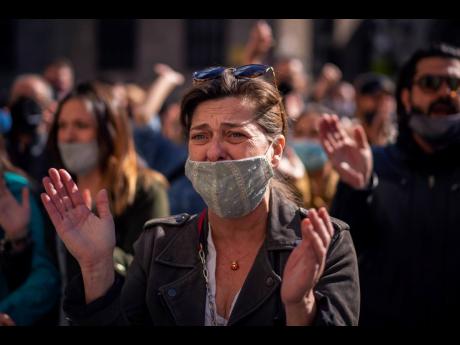Closing schools is latest front in virus fight
PRAGUE (AP):
Dark splotches that indicate zones of high coronavirus contagion are staining maps of Europe blood red as governments scramble to prevent another round of total lockdowns, even by taking unpopular decisions to close schools, bars and gyms.
The Czech Republic has overtaken Spain as Europe’s biggest hotspot during the resurgence of COVID-19. Britain, France, Belgium, Russia and many other countries are following the same unnerving trend.
Medical centres are generally better prepared than during the first wave of the pandemic. But many medical workers are demoralised by what they see as the ineffective leadership of authorities who have tried to protect public health as well as ailing economies.
European countries, and even regions inside countries, are applying drastically contrasting strategies. In one area, bars are considered breeding grounds of outbreaks, while across the border or city limits, schools are deemed viral cauldrons. Here’s a look at key virus topics in Europe.
A SCRAMBLE AS SCHOOLS CLOSE IN CZECH REPUBLIC
The Czech Republic opted to close schools on Wednesday to lower an accumulated rate of 521 virus cases per 100,000 inhabitants over 14 days, the highest national level in Europe.
“I apologise to school directors. I apologise to parents for the permanent uncertainty. But it’s necessary to do it and to do it fast,” Czech Education Minister Robert Plaga said.
The unpopular measure was necessary to prevent the health system from collapsing, Health Minister Roman Prymula said in Tuesday’s televised address, which was watched by almost a third of the nation.
Prymula said the number of infected teachers and education employees have skyrocketed since September, reaching 4,500, more than the number of health personnel who are ill from the virus. Students represent 16 per cent of infections, more than any other group, he said.
Patients in Czech hospital beds have doubled in two weeks, and Interior Minister Jan Hamacek warned that hospitals might reach their limits by the end of October.
A RUSH TO GET THE LAST PINTS IN NORTHERN ENGLAND
In England, the northern city of Liverpool on Wednesday became the first city put under the government’s toughest restrictions in a new three-tier system that forces pubs and bars that don’t serve meals to close.
The looming restrictions led to some unruly partying in Liverpool on Tuesday night, when pub goers poured into the streets to dance and taunt police as pubs closed. Images of the gatherings popped up on social media, including one video of a crowd of partiers banging on a police car as it inched through the crowd.
“These pictures shame our city, attacking our brave police officers is unacceptable,” Liverpool Mayor Joe Anderson wrote on Twitter. “Our health service is creaking, 300 in hospital and 30 people dead in week. Ignoring these facts is why we are in tier-3 measures.”
In addition, indoor social gatherings with people from other homes are banned, and residents are advised not to travel outside the area. The measures will be reviewed regularly, but could last as long as six months.
BELGIUM WORRIED ABOUT ICU CAPACITY
Belgium’s intensive care units (ICUs) will reach capacity by mid-November if the contagion is not checked, according to health authorities.
Belgium is the second-worst European country with 429 cases per 100,000 inhabitants over 14 days. All virus indicators have deteriorated in recent weeks, as hospital admissions and virus deaths are on the rise.
Last week, Belgium introduced local curfews and closed bars in Brussels for at least a month.
RUSSIA HITS DAILY RECORD OF NEW INFECTIONS
Russia, which has the world’s fourth-largest coronavirus caseload of more than 1.3 million people, has been reporting over 10,000 new cases for 11 straight days. The 14,231 new infections reported on Wednesday is the highest number since the beginning of the pandemic.
Most of the virus restrictions in Russia were lifted over the summer. Despite the worsening situation, Russian authorities have dismissed suggestions of a second lockdown and haven’t introduced any major restrictions.
Moscow officials have urged the elderly to self-isolate and have extended school holidays by one week. Students in the capital from sixth to 11th grades will now move their studies online for two weeks.
“Older school students are more susceptible to the risk of contracting the coronavirus,” said Moscow Mayor Sergei Sobyanin. “They account for two-thirds of infected children.”
FRANCE LOOKS AT RESTRICTIONS TARGETING THE YOUNG
France is bracing for possible curfews and other restrictions particularly aimed at young people. The government is also seeking volunteers to pitch in at hospitals, as some doctors warn they’ll run short of staff if the infections don’t subside.
France’s government has already put Paris, seven other big cities and the Caribbean island of Guadeloupe under maximum virus alert, closing bars, banning student parties, and capping the size of gatherings. Bar and other business owners have organised numerous protests in response, saying they won’t survive the crisis.
INFECTIONS SPIKING IN SPAIN, GERMANY, SWITZERLAND
Spain on Wednesday became the first European Union country to surpass 900,00 cases. Germany passed 5,000 new daily cases for the first time since mid-April, while Switzerland reported a new daily record in confirmed coronavirus cases, with young adults the most affected.

